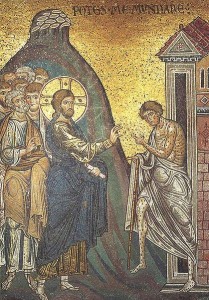 2 Kgs 5:14-17
2 Kgs 5:14-17
Ps 98:1, 2-3, 3-4
2 Tm 2:8-13
Lk 17:11-19
Our Old Testament and Gospel readings this weeks both relate how an outsider (a non-Jew) is brought to worship the true God of Israel through a miraculous healing. The Gospel reading of the one thankful leper, the Samaritan, who returns to thank Jesus, is narrated only in Luke and has a similar message that the Good Samaritan does. We are supposed to be a bit shocked by who Jesus’ story favors. The Samaritans, of course, were considered “ethnically impure” from a Jewish perspective. But this leper, who was made doubly outcast by both his “race” and his disease, is the only leper who returns to Jesus to show his thanks and to acknowledge Jesus as the power behind his healing. Jesus, appearing a bit miffed at the other nine, tells the grateful Samaritan to “Stand up! Your faith has saved you.” Jesus’ command to stand carries with it connotations of the resurrection, literally, standing up from the dead. Not only, then, is this a story about how to treat the outcast; it is also a story of salvation.
The theme of salvation is the focus of our second reading from 2 Timothy:
If we have died with him
we shall also live with him;
if we persevere
we shall also reign with him.
But if we deny him
he will deny us.
If we are unfaithful
he remains faithful,
for he cannot deny himself.
These poetic lines suggest that through baptism, Christians are incorporated into Jesus’s death and the hope that they will eventually live with him. But the passage also pushes the idea of perseverance, of remaining faithful, even in the midst of suffering. The lines “if we deny him, he will deny us” carry an ominous tone and should lead us to ask serious questions about our own faithfulness to Christ.
Christians of all types get accustomed to resting self-assured in our Christian identity. It is easy to feel confident about our own salvation. Sure, we could do bit better, we might tell ourselves, but at least there is purgatory (wink, wink!). We tend to think that since we are baptized Christian, our salvation will work itself out. And in the meantime, we go on living our lives. Our Christian faith really does little to make us different from any other person surrounding us.
The story of both the Good Samaritan and the Thankful Leper are supposed to shake us out of this self-satisfaction and comfort. These stories serve to help us realize that just being part of the right group is not enough and that the very act of living our ordinary lives may lead us precisely to denying Christ, which our second reading tells us, will lead Christ to deny us.
Christianity demands, to some extent, that we stand out, that we break away from the crowd and do something different. We do this in two ways: by our love (or just our taking the time to actually show care, as witnessed in the Good Samaritan story) and by our witnessing to the world that Christ, and not our own efforts or credentials, is the true source of our power to do the former (as witnessed in the Thankful Leper story).
In the story of the Thankful Leper, we might think of the healing from leprosy as an allegory for baptism. In baptism, we are literally cleansed from sin and given the basis for a relationship with God that we was previously not possible due to the alienation caused by sin. But cleansing is not enough. We must freely return to Christ, the source of our cleansing. We need to keep coming back to Him to acknowledge our gratitude and dependence. This life-long process of returning to Christ with thankful and humble hearts is the process of sanctification, of becoming holy, and of showing our fidelity to Christ so that one day, He might say to us like he said to the leper, “Stand up! Your faith has saved you.”




Trackbacks/Pingbacks